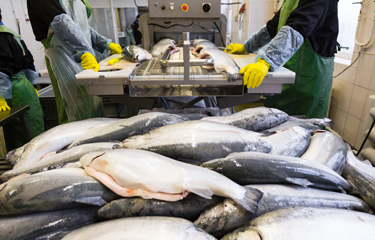The latest report from the financial think tank Planet Tracker has found that an investment in traceability could be a profitable move for seafood processors, with a better return than the industry’s traditional method of creating value through mergers and acquisitions.
The London, United Kingdom-based nonprofit organization, which focuses on studying environmental issues from a financial perspective, found profit margins could be as much as doubled through the implementation of effective traceability solutions that comply with the Global Dialogue on Seafood Traceability (GDST)’s open source standards, which were released in March 2020, according to its Traceable Returns report, which was released in October.
In the USD 140 billion (EUR 118.2 billion) global seafood processing industry, where almost half the revenue is generated in Japan, the United States., Norway, and Thailand, earnings before interest and taxes (EBIT) margins currently run as low as 3 percent. M&A was responsible for two thirds of sales growth in seafood processing between 2017 and 2019 and is likely to become more dominant as consolidators take advantage of COVID-19-related casualties. However, Planet Tracker found that cost savings related to M&A are unlikely to raise margins of the acquirer in the same way that traceability would.
The report suggests that almost 75 percent of the seafood sold today is not yet certified or rated as sustainable, and claims of sustainability cannot necessarily be guaranteed due to a current lack of sea-to-plate traceability. The inability of the industry in general to operate a more cohesive and transparent supply chain, is in part due to gaps in the chain, incompatible systems, and poor data capture and management.
The report was prepared as part of the organization’s Seafood Tracker initiative, which investigates the impact financial institutions can have on sustainable corporate practices through their funding of publicly-listed wild-catch and aquaculture companies. Of the 4,000 seafood processors in operation around the world, just 89 are listed on a stock exchange. Planet Tracker mapped these out and analyzed the challenges they face in implementing traceability, along with the potential benefits of doing so.
Planet Tracker found just a handful of small non-listed companies and a single large, listed corporation were operating full traceability solutions. The report asserts that seafood processing companies that implemented traceability systems were able to verify sustainability claims; avoid exposure to illegal, unreported, and unregulated (IUU) fishing; and reduce product recalls, product waste, legal costs, and other investor risks through the implementation of a traceability system.
However, the cost factor involved in setting up and maintaining a comprehensive system is a significant factor at play in the slow uptake of traceability solutions, the report found. The need to justify a claim of sustainability has become a necessity in many markets, but retail price premiums are not reaching back through the supply chain to create an incentive for more sustainable management of natural capital, the researchers found. As a result, traceability is perceived by many companies as a costly necessity, rather than an opportunity.
Specifically, the report encouraged seafood processing firms implement traceability systems compliant with the GDST’s Framework 1.0, which sets out how data should be captured and managed through the supply chain and are fully compatible with the existing GS1 Electronic Product Code Information Services (EPCIS) standards used by retailers.
Because the industry-wide adoption of GDST standards would greatly advance sea-to-plate traceability, they have been endorsed by organisations including the Seafood Business for Ocean Stewardship (SeaBOS), the Global Tuna Alliance, and the U.K. Seafood Industry Alliance. Additionally, many multiple large retailers across the world have already pledged to adopt and implement them, including Sainsbury’s and Whole Foods.
Thus far, numerous large seafood companies including Thai Union, The Fishin’ Company, Labeyrie Fine Foods, Orca Bay Foods, and New England Seafood have all signed the GDST 1.0 Adoption Statement, in which they pledge to “work to adopt and implement these standards over time.” However, the words “over time” means those companies have not committed to any specific action or timeline for implementing the GDST standards. Instead, it is public statement of agreement that GDST 1.0 should be accepted as the new global industry standard for seafood traceability.
“Although the GDST standards leave room for improvement, widespread implementation is a much-needed step for the seafood processing industry to manage its risk, while at the same time improving its sustainability, profitability, and accountability,” Planet Tracker Research Director John Willis said in a webinar covering the report. “Investors in seafood processing companies are well-placed to engage with [corporations] and ask vital questions, such as what traceability initiatives are in place, is the company GDST-compliant, and what are the financial benefits and costs of implementing GDST compliant traceability? Such conversations will be essential for raising the issue to the top of the industry’s agenda and addressing the fragmentation in its supply chains.”
Photo courtesy of TRMK/Shutterstock







